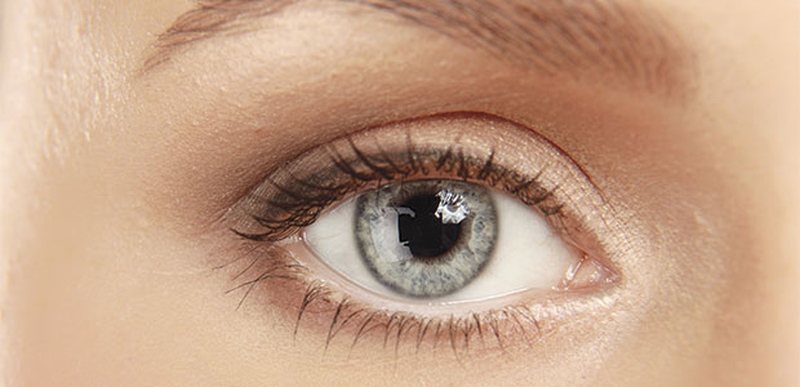Eye twitching (also referred to as spasm of eyelid or tics, or medically known as blepharospasm) is a short term repetitive phenomenon that is fairly common in general population and is generally not associated with a serious organic issue. In most cases, twitching eye involves lower eyelid but the upper lid may also be involved. These twitches does not cause any pain or harm, and usually resolves spontaneously. However, many people are curious to find out "why does my eye twitch?"

What Causes Eye Twitching?
Tiredness
Your twitching can also be a result of chronic sleep deprivation, visual fatigue and tiredness that may lead to spasm/ irritation of eye muscles. In all such cases, relaxation of eyes (via sleeping or closing your eyes for 15 minutes) is helpful in alleviation of symptoms.
Eye Strain
Eye twitching can also be due to visual acuity (eyesight issues). In addition, some individuals also experience eye twitching due to visual strain caused by prolonged use of incorrect lenses and glasses for visual enhancement. Twitching is the result of strain caused by persistent struggle of eyes for clearer vision. Last but not least, twitching eye can also be due to eye strain caused by long hours of multimedia use (computer, tablet, laptop, television etc.)
Stress
Different tissues respond differently to stressful situations and may manifest abnormal symptoms. Researchers believe that eye twitching is also an abnormal response to persistent strain or stress to the visual apparatus. It is highly recommended to relax your eyes and manage/ avoid the source of stress. In most cases, this might be the only intervention needed to stop the eye from twitching.
Caffeine or Alcohol
Excessive and poorly regulated use of caffeine or alcohol can also cause eye twitching, due to hyper-stimulation of nerve endings that are responsible for motor control. It is highly recommended to cut down your intake of these stimulants if you are experiencing persistent eye twitching.
Dry Eyes
Dry eyes (also referred to as keratoconjunctivitis sicca in sophisticated medical terms) are reported very frequently as part of physiological aging, excessive use of computers and mobile phones or daily intake of medicines which may lead to dryness of eyes. A number of pharmacological and surgical options are available for the long term management of dry eyes in serious conditions. You can also try home remedies or complementary tips after discussing with your primary care provider.
Nutritional Deficiencies or Imbalances
Lack of certain nutrients such as vitamins and minerals can also lead to eye twitching. It is imperative to mention that nutritional supplements should be considered only after consulting with your primary care provider.
Allergic Reactions
Allergic conditions of eye can also present with twitching eyes in addition to watering of eyes and irritation. In addition, allergic conditions involving other systems can also cause twitching. Some doctors suggest eye drops while others advice oral anti-allergic medications. Other symptoms of allergy are itching and swelling of lids.
Other Causes of Eye Twitching
Eye twitching can also be in response to the use of certain medication. Additionally, eye twitching can also be a mild, non-specific symptom of an organic disturbance in the visual apparatus such as:
Pinkeye
Blepharitis (inflammatory reaction of the eyelids)
Light sensitivity
In some extremely rare cases, eye twitching is due to a nerve disorder or organic condition such as:
Dystonia
Parkinson’s disease
Bell’s palsy
Tourette’s syndrome
Some more causes of eye twitching are physical exertion, wind, and air pollution.
How to Deal with Eye Twitching
In most benign cases of eye twitching, symptoms can be easily stopped by maintaining healthy sleep pattern. Other helpful tips are reducing the intake of caffeine and alcohol, maintaining optimal hygiene and minimal use of cosmetics. Eye twitching can also be controlled by making some adjustments in your diet (such as increasing the amount of magnesium, potassium, vitamin and fruits like banana and berries). But before applying these remedies, you should first contact your doctor to learn the actual cause of eye twitching.
When to See a Doctor
You should see a doctor if:
If your symptoms lasts for days or weeks, then symptoms of eye twitching can be more than just a temporary irritation. If not managed adequately, it can become chronic and can cause repetitive eye winking along with squinting and vision impairment. In these severe cases, you must visit your doctor for proper treatment.
It is also important to visit a doctor if your eyes look red and swollen.
When it seems difficult for you to keep your eyes open, or your eyes get completely closed while twitching.
If you are experiencing discharge from your eyes.
If you feel burden on your eyes and your eye lids seem falling.
Interesting Superstitions About Eye Twitching
“Your right eye is twitching? You are going to get wealthier soon” seems silly? But many people believe that. There are hundreds of superstitions and myths regarding eye twitching. It gets even interesting because mythological beliefs are different for right eye twitching vs. left eye twitching.
Chinese say “If your left eye twitches, it is a signal for hazards and if your right eye twitches, it is a signal for wealth.” Many people claim that they can predict future based on these beliefs. The most astonishing superstition about eye twitching is from an anonymous origin, according to which twitching of left eye suggests that your loved one is going to die soon and if the right one twitches, a baby will soon born.
Indians on the other attributes good things with the twitching of left eye. It is always a bad sign in Indian culture if you are experiencing twitching of right eye.
Malaysian believe that if your right eye twitches, someone who lives far will pay you a visit and if the left one twitches, it means that you are going to cry. In Hawaii, people believe that if your left eye twitches, it’s the sign that a stranger will visit you very soon.

View All Comments /Add Comment